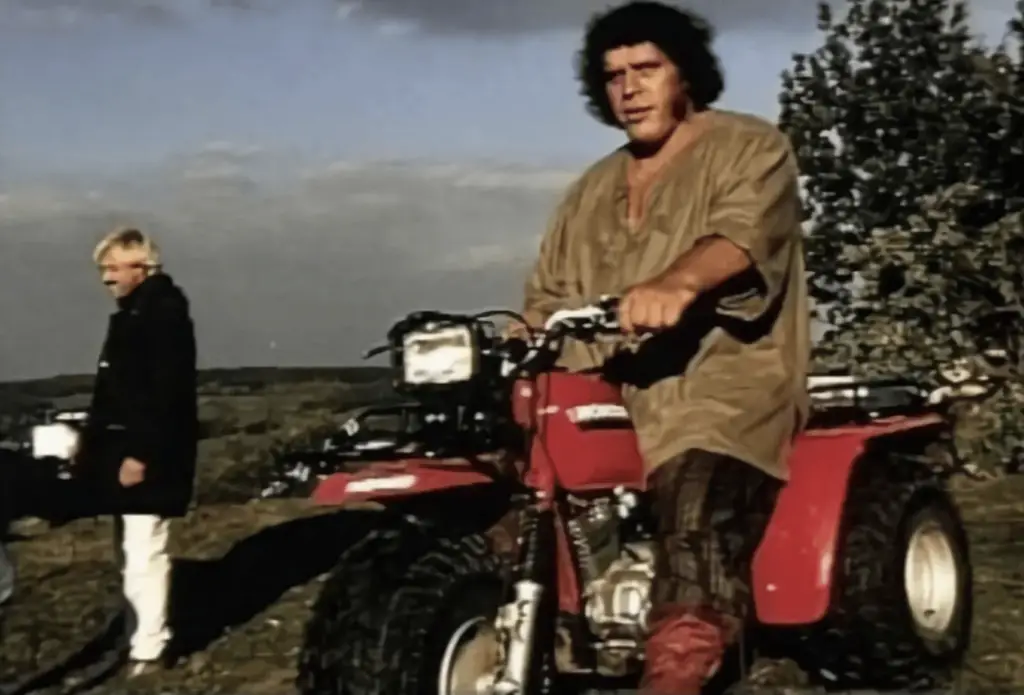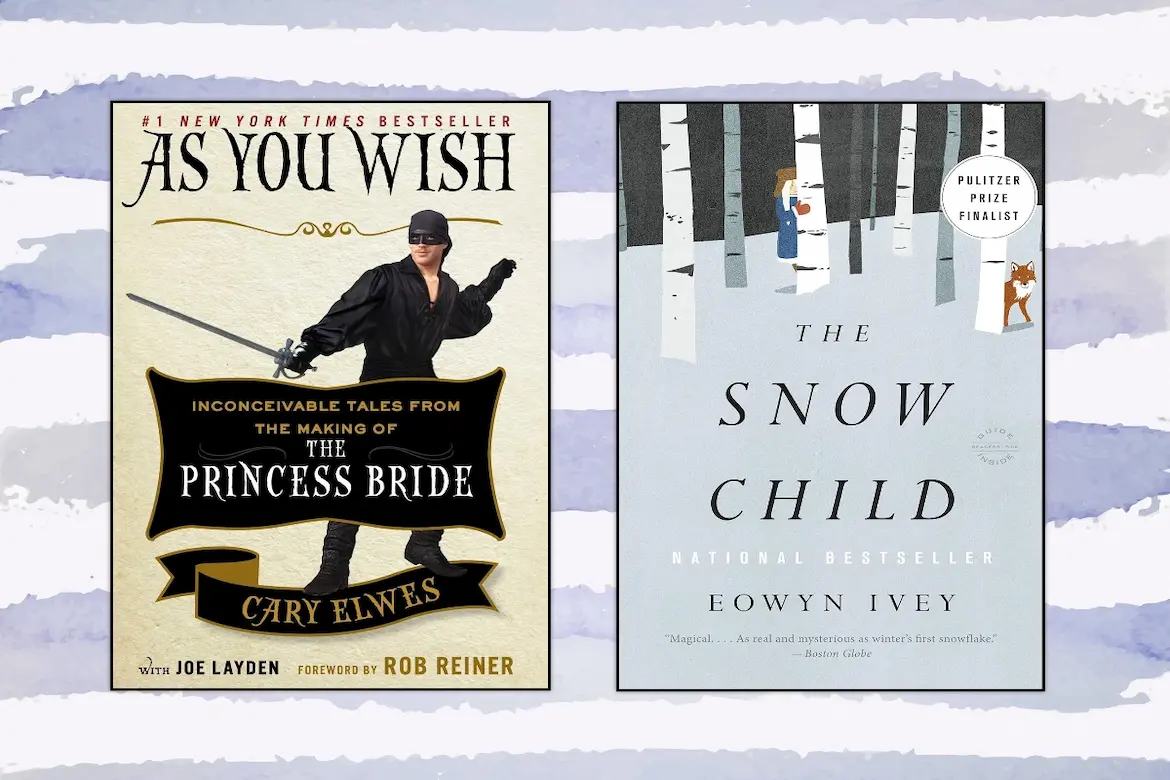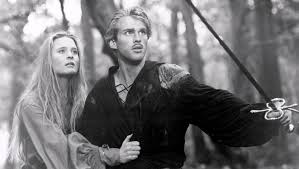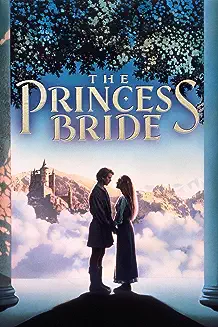We are taking a look back at two notable LitStack Recs. First, we recommend As You Wish, the 2020 memoir by actor Cary Elwes that might be the perfect gift for The Princess Bride fan in your life. Second, we recommend The Snow Child, if you have the desire to read something “gritty but not too gritty.”
Table of Contents
As You Wish: Inconceivable Tales from the Making of The Princess Bride—by Cary Elwes with Joe Layden and a foreword by Rob Reiner
This 2020 memoir by actor Cary Elwes might be the perfect gift for the Princess Bride fan in your life. Co-authored with Joe Layden, this “mini-memoir,” as Elwes has calls it, is an account of a young actor’s education as he embarks on an iconic role from a revered, idiosyncratic novel (written by William Goldman in 1973), and the making of a film that, while appearing effortless on the surface, required extraordinary cinematic worldbuilding in a time before CGI. It’s also a film that, thirty-five years later, remains an enduring classic, along with does William Goldman’s book—and what book wouldn’t, with lines like, “When I was your age, television was books!”
As Elwes reminds us, The Princess Bride is a story that entails:
Fencing . Fighting . Torture . Poison . True love . Hate . Revenge . Giants . Hunters . Bad men . Good men . Beautiful ladies . Snakes . Spiders . Pain . Death . Brave men . Cowardly men . Strongest men . Chases . Escapes . Lies . Truths . Passion . Miracles .


In its beginning stages, the project’s hybrid genre, as Elwes writes, “seemed destined to languish in what is commonly known in the business as ‘Development Hell,’” a project passed between studios unable to secure backing, or worse, meeting disinterest. As Goldman once put it, “Even François Truffaut couldn’t make this movie.”
Truffaut, along with Robert Redford, Norman Jewison, and others, did indeed attempt to adapt the book for film, but the idiosyncratic structure, meta references, and fairy tale irony proved difficult to capture—and sell. But made it was. Eventually, Norman Lear read the script and the movie found its backer. Lear worked closely with Rob Reiner on the screenplay, and Reiner would go on to direct the film.
Elwes, born and raised in London, read the book when he was thirteen, and would go on to briefly attend the London Academy of Music & Dramatic Art. Before Princess Bride, his film credits included a historical drama released in 1984, Another Country, with Rupert Everett and Colin Firth, and soon after, Trevor Nunn’s period drama, Lady Jane, based on Lady Jane Grey, the nine-day queen of England whose brief reign followed the death of King Edward VI. After seeing the film, Reiner avidly pursued Elwes for the role of Westley.
Elwes’ prose style is light, self-deprecating in places, and sincere in his admiration for the film, its creators, actors, and characters.
There are chapters here dedicated to Meeting Fezzik (Elwes confesses to being a “lunatic” fan of André René Roussimoff, aka André the Giant); the intense, 40-week training required of him and fencing partner Mandy Patinkin for the famous swordplay scene (“Scripted fighting is very much like the choreography of a dance: two partners working with each other in an attempt to create something perfectly synchronized”); a chapter on The Castle, that would be Prince Humperdinck’s in Florin (parts of which dated back to the eleventh century); Vizzini and Miracle Max; and of course, Buttercup. There’s also a chapter on A Couple of Mishaps (you can find extras and outtakes on YouTube).


Inserted into the actor’s account are testimonies from cast members and crew, like this one from Carol Kane, on the hazards of an actor being too good-looking: “sometimes when a young man or young woman is that extraordinarily beautiful, they don’t rely much on their sense of humor, but I think that when you crack the nut open, that’s the delicious part,” or Billy Crystal recalling lunch breaks in the canteen: “So I’d order lunch in character as Max, and it was like, “How is the shepherd’s pie? Is it spicy? Will I regret it in the morning?”

There are also excellent behind-the-scenes stories—of screenwriter Buck Henry in his trademark baseball cap and glasses; an account of Westley’s battle with Fezzick: “…when you see Westley fall to the ground and pass out, that’s not acting. That’s an overzealous actor actually losing consciousness.” Elwes covers other unexpected injuries he incurred while making the film (“I woke up in the emergency room, still in costume, to the frightening sound of stitches being sewn into my skull“), and the painful reality, once the film was released, that this labor of love appeared not to capture the hearts of audiences. That, of course, would change.
Elwes reflects on how the film influenced his life, and how, as the years passed, its importance to audiences has lent perspective on what it’s meant to play fictional characters in film. And despite the outsized influence The Princess Bride has had on audiences, Elwes appears to have retained a modest outlook. When meeting Bill Clinton, the actor was genuinely impressed when the president confessed, “Chelsea and I are huge fans of The Princess Bride.”
—Lauren Alwan
Enjoy the Princess Bride on DVD and Prime!
The Snow Child, by Eowyn Ivey
I used to seek out books that were up for major awards – Man Booker, Pen/Faulkner, Pulitzer – but that was back when I was younger, with lots of time to consume books full of rich prose and complex plotting. As time went on, I found myself weighed down by books that were often bleak and difficult, even if wonderfully written.
But a friend recommended The Snow Child, after I expressed the desire to read something that was “gritty but not too gritty.” I was a little nervous when I saw the book had been shortlisted for a Pulitzer (in 2013), but her advice was true. It exactly fit with what I was looking for.


Based on a Russian folktale, the story follows Jack and Mabel, a childless couple struggling as homesteaders in the Alaskan wilderness in the 1920s when the sudden emergence of a young girl from the woods changes their lives. And while this is the defining kernel for the novel, it is how it is supported that makes this book so lovely.
We first see Jack and Mabel as isolated – physically from the nearest town or their closest neighbors, emotionally from each other, and by choice from their families on the other side of the continent. Their success or failure is as much in the hands of fate as it is owed to their own stubborn perseverance. We learn quickly that Mabel continues to deeply mourn the child she lost to stillbirth, one of the mitigating factors for the couple moving to the wilds of Alaska. The silence between the two is deafening.
And yet, there are whimsical moments between them, such as the snowy night where they impulsively build a snowman – or snow girl, as it were. And although this moment is rare, it is not out of character for either, in their wonderful crafting by author Ivey – and these moments lead to wonderful things.
The entire book is full of deeper craftings than one might expect, given the lede of a book of this mien. Alaska is drawn as both cruel and beautiful, but the cruelty is treated stoically rather than harping on its harshness, and the beauty never devolves into vistas that belong more in a story of singing nuns than one of stubborn survival. While the neighbors Jack and Mabel have may be distant, they are warm and lively (in acute contrast to the main characters’ austerity).
The mystery surrounding the appearances of the snow child are explored, then explored in a wider circle, then explored again yet farther, and it is done gradually and cautiously, as befitting a child of the woods creeper towards the promise of family.
There is drama in this book, sometimes gripping but never contrived. Jack and Mabel’s highs and lows, while at times unexpected, are not unrealistic (and this said about a book with the fantastical at its heart!). And the journey that they make towards each other is both wrenching and tenderly portrayed. I was constantly expecting certain things to happen while reading this book, as I have been conditioned to expect such things in my years of reading, but was pleasantly surprised when they either did not happen as expected, or they occurred in a way that felt true to the story rather than borne from convention.
The Snow Child was a wonderful recommendation given to me, and now I am giving it to you. I hope you find the tale just as satisfying as I did.
—Sharon Browning
Other Titles by Eowyn Ivey

Other LitStack Resources
Be sure and look at our other LitStack Recs for our recommendations on books you should read, as well as these reviews by Lauren Alwan, and these reviews by Sharon Browning.
As a Bookshop, BAM, Barnes & Noble, Amazon, and Lumas affiliate, LitStack may earn a commission at no cost to you when you purchase products through our affiliate links.







